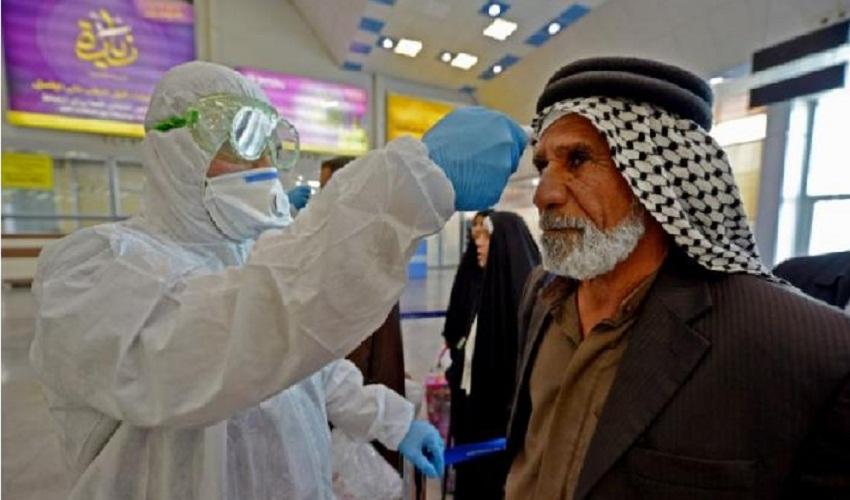Corona in Iraq: a fourth wave amid a low vaccination rate
Baghdad: Face masks are almost invisible in Baghdad's shops and buses, despite the fact that the Covid-19 epidemic is still present strongly in a country where vaccination rates are low, and people turn to hospitals only as a last resort.
Al-Shifa Governmental Hospital in Baghdad, which has been converted into a center for COVID-19 since the outbreak of the epidemic, can accommodate 175 patients, and includes 40 intensive care beds, half of which are full.
And the hospital's assistant director, Ali Abdul-Hussein Kazem, says that "about 95% of Covid patients who enter intensive care are not vaccinated."
In the intensive care unit, the sharp and intermittent sound of the respiratory and serum monitoring devices is dominated by the sharp and intermittent sound.
An old man and a young woman share the same spacious care room. Both are connected to respirators. A family member is allowed to visit, provided he wears a mask and a special white medical uniform for protection.
In an adjoining room, a man in his sixties, also connected to a breathing machine, pushes the bed cover off of him, fidgeting. One of his relatives, who was sitting with him, alerted the doctor: "He says he feels suffocated."
Fourth pandemic wave
Iraq, with a population of more than 40 million, has been facing a fourth pandemic wave since January, but no prevention restrictions have been imposed.
Since the outbreak of the epidemic, more than 2.2 million people have been infected with it in Iraq, and more than 24 thousand people have died.
In recent days, despite the rapid spread of the mutant omicron, infections have decreased. The official daily toll is about two thousand.
Despite the widespread campaign launched by the authorities to encourage Iraqis to receive the vaccine, and with the presence of 1,400 vaccination centers, the process has stalled, as only less than 10 million people have received the vaccine, as confirmed to AFP, spokesman for the Ministry of Health, Saif Al-Badr.
Of those, less than seven million received the second dose, and only about a hundred thousand people received the third dose. While 66% of neighboring Iran's population of 83 million received both doses.
Doctors Without Borders program
The Director of the Care Department at Al-Shifa Hospital, Muhammad Saleh, conducts his morning tour, checking the x-rays and providing directions to his team.

The 49-year-old doctor says, "The majority of patients, 90% or more, are elderly, over sixty years old, and most of them have chronic problems, such as diabetes, high pressure in the artery, and kidney problems."
Doctors and nurses from the Doctors Without Borders organization, which provides assistance to the hospital, are accompanied by Saleh with expertise.
In addition to the training that "ensures a sustainable treatment", explains MSF's medical officer, Daniel Ochs, the MSF program, launched in November, also provides services in physical therapy and mental health.
Combating fake news is also a priority. "The majority of pregnant women who enter the hospital are not vaccinated, because they are afraid that the vaccine will affect the fetus," says Ochs.
Saleh talks about another phenomenon. He says that "most patients stay at home for a long time and are not admitted until they reach the critical stage."
"Sometimes, we are unable to reverse the damage done to the patient in terms of lung, circulatory system and kidneys," he adds. The reason, according to him, is that "the patient stays at home, listens to social media and is affected by rumours."
The bad reputation of the health sector in Iraq, which has been exhausted by decades of wars and the international embargo that passed on the country, contributes to this.
"Citizens are very afraid of hospitals because of the rumors they receive that you will not find appropriate treatment in the hospital and they will not care about you," says a nurse who preferred to remain anonymous.
many challenges
In 2021, two devastating fires ravaged two public hospitals in just months. More than 80 people died one night in April in a hospital in a suburb of the capital.
The authorities acknowledge that there are many challenges in a sector whose share of state spending does not exceed 2% in the oil-rich country.
"In previous governments, health was not a priority," says Saif al-Badr.
"After the war with ISIS, the health sector infrastructure in some governorates was completely destroyed," he added.
Despite this, Al-Badr continues, "We have thousands of beds prepared to deal with difficult respiratory cases, and all medicines, medical supplies and vaccines are available."
75-year-old Farouk Naoum is preparing to return home from Al-Shifa Hospital, after recovering from the Corona virus. Despite receiving two doses of the Pfizer vaccine, he fell ill.
His son, a dentist, came to pick him up. "This is my 31st day in the hospital," Farouk says. "I was admitted to the hospital on January 9. You have to be careful, caution is the most important thing."










